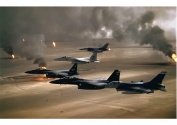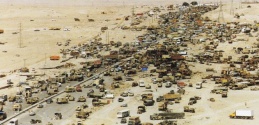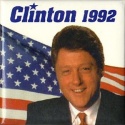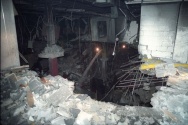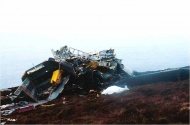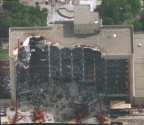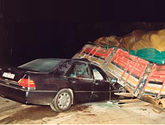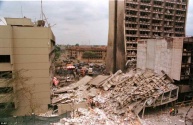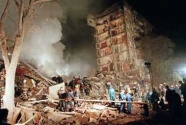Difference between revisions of "1990s"
(internet section) |
|||
| (11 intermediate revisions by the same user not shown) | |||
| Line 1: | Line 1: | ||
{{decade | {{decade | ||
| − | |image= | + | |image=Gulf War jets.jpg |
| − | |description= | + | |description=The first post-[[cold war]] decade, in which the [[Military Industrial complex]] transitioned to "Islamic terrorists" as the new enemy, complete with various acts of [[false flag]] "terrorism". Nevertheless, it appears to have been wrongfooted by the rapid rise of the [[internet]] as a many to many broadcasting system, which was largely uncensored and unregulated. |
| + | |image_caption=Jets in the first [[Gulf War]] against [[Iraq]] | ||
|constitutes= | |constitutes= | ||
}} | }} | ||
| − | The '''1990s''', as the first post-[[Cold War]] decade, were an exciting time in | + | The '''1990s''', as the first post-[[Cold War]] decade, were an exciting time for many, who had long anticipated a more peaceful world order. US defence spending was at a low in and the public were looking forward to a [[peace dividend]], as rsources were spent on social uplift instead of the military.<ref>https://www.corbettreport.com/the-real-cost-of-the-war-of-terror/</ref> However, predictions of a winding down of the [[permanent war economy]] were premature. |
| + | |||
| + | ==Gulf War== | ||
| + | {{FA|Gulf War}} | ||
| + | The [[Gulf War]] was indicative of a more unipolar policy which was to prevail in the [[Middle East]]. After raising no objection to [[Saddam Hossein]]'s mooted plan to invade [[Kuwait]], [[George H. W. Bush]] quickly gathered a coalition to invade the country. | ||
| + | |||
| + | ==Rise of "terrorism"== | ||
| + | [[image:Oklahoma City bombing.jpg|333px|right|thumbnail|The [[OKC Bombing]] is subject to multiple irregularities. It was 'investigated' by the same small group who later investigated [[9/11]]]] | ||
| + | However, [[permanent war machine]] began to arrange incidents of "[[terrorism]]" and started to talk about ''increased'' military expenditures. The mid 1990s saw the launching of [[Operation Gladio/B]] which sought to replace fear of [[communism]] with fear of [[radical]] [[Islam]]. | ||
| + | |||
| + | Various large terrorist events occurred, such as the [[Oklahoma City Bombing]], which have the hallmarks of [[false flag]] operations. This phenomenon was not confined to USA or Europe; in [[1999]], the [[Russian apartment bombings]] were carried out while the [[FSB]] was under the directorship of [[Vladimir Putin]]. Ascribed to [[Chechnya]]n terrorists, these came at a useful time for the [[Russian]] government. An invasion of Chechnya was launched and Putin's popularity soared. | ||
| + | |||
| + | ===Operation Gladio/B=== | ||
| + | {{FA|Operation Gladio/B}} | ||
| + | Unknown at the time, and still publicly unadmitted to, the mid 1990s saw a replacement of the original [[Operation Gladio]], which had exploited ultra-nationalists to carry out atrocities which were then blamed on communists. Gladio/B, according to [[Sibel Edmonds]], was developed to carry out the strategy of tension particularly in oil rich areas, by demonising "[[radical]]" Islam. Towards the end of the 1990s,{{when}} the names of [[Ossama Bin Laden]] and [[Al Qaeda]] were introduced in Western {{ccm}}, in preparation for the [[9-11]] event. | ||
| + | |||
| + | ==Stifling of investigative journalism== | ||
| + | The 1990s saw a concentration of ownership{{cn}} and a decline in [[investigative journalism]] in the UK, both in [[newspapers]] and on [[television]] (for example, ''[[The Cook Report]]'' (1999) and ''[[World in Action]]'' (1998). This may have been a worldwide phenomenon.{{cn}} | ||
==Rise of the Internet== | ==Rise of the Internet== | ||
| − | The popular misconception that the [[internet]] was invented in the 1990s<ref>Actually, it was invented decades earlier, but was | + | [[image:Steve Kangas.jpg|left|172px|[[Steve Kangas]], shot dead in [[1999]] after pioneering [[internet]] activism.|thumbnail]] |
| + | The popular misconception that the [[internet]] was indeed invented in the 1990s<ref>Actually, it was invented decades earlier, but was originally used only by a rarefied community of military and academic researchers.</ref> reflects the fact that it is synonymous with the [[WWW]], which was indeed invented in the 1990s. In 1996, [[Gary Webb]]'s pioneering use of the WWW to break his ''[[Dark Alliance]]'' expose of [[CIA drug trafficking]] had established its feasibility as a way of avoiding [[Corporate_media/Deep_state_control|deep state control]] of the {{ccm}}; at the peak of its popularity, the Dark Alliance website was getting about 1,000,000 hits/day. While occasional actions were taken in response to posting on the internet (many believe that [[Steve Kangas]]' death resulted from his usenet postings) the internet was not a subject of regulation and although usage was much less than nowadays, monitoring technologies were not well developed. Until about 2000, there was a popular belief was that the internet would prove impossible to regulate.<ref>http://cyber.law.harvard.edu/teaching/ilaw/2011/Summary_of_Four_Phases</ref> | ||
{{SMWDocs}} | {{SMWDocs}} | ||
| + | |||
==References== | ==References== | ||
{{reflist}} | {{reflist}} | ||
| − | |||
Latest revision as of 07:21, 6 April 2019
| 1980s« | |
|---|---|
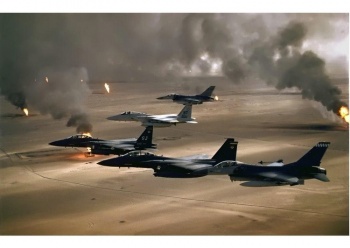 | |
| The first post-cold war decade, in which the Military Industrial complex transitioned to "Islamic terrorists" as the new enemy, complete with various acts of false flag "terrorism". Nevertheless, it appears to have been wrongfooted by the rapid rise of the internet as a many to many broadcasting system, which was largely uncensored and unregulated. |
The 1990s, as the first post-Cold War decade, were an exciting time for many, who had long anticipated a more peaceful world order. US defence spending was at a low in and the public were looking forward to a peace dividend, as rsources were spent on social uplift instead of the military.[1] However, predictions of a winding down of the permanent war economy were premature.
Contents
Gulf War
- Full article: Gulf War
- Full article: Gulf War
The Gulf War was indicative of a more unipolar policy which was to prevail in the Middle East. After raising no objection to Saddam Hossein's mooted plan to invade Kuwait, George H. W. Bush quickly gathered a coalition to invade the country.
Rise of "terrorism"

However, permanent war machine began to arrange incidents of "terrorism" and started to talk about increased military expenditures. The mid 1990s saw the launching of Operation Gladio/B which sought to replace fear of communism with fear of radical Islam.
Various large terrorist events occurred, such as the Oklahoma City Bombing, which have the hallmarks of false flag operations. This phenomenon was not confined to USA or Europe; in 1999, the Russian apartment bombings were carried out while the FSB was under the directorship of Vladimir Putin. Ascribed to Chechnyan terrorists, these came at a useful time for the Russian government. An invasion of Chechnya was launched and Putin's popularity soared.
Operation Gladio/B
- Full article:
 Operation Gladio/B
Operation Gladio/B
- Full article:
Unknown at the time, and still publicly unadmitted to, the mid 1990s saw a replacement of the original Operation Gladio, which had exploited ultra-nationalists to carry out atrocities which were then blamed on communists. Gladio/B, according to Sibel Edmonds, was developed to carry out the strategy of tension particularly in oil rich areas, by demonising "radical" Islam. Towards the end of the 1990s,[When?] the names of Ossama Bin Laden and Al Qaeda were introduced in Western commercially-controlled media, in preparation for the 9-11 event.
Stifling of investigative journalism
The 1990s saw a concentration of ownership[citation needed] and a decline in investigative journalism in the UK, both in newspapers and on television (for example, The Cook Report (1999) and World in Action (1998). This may have been a worldwide phenomenon.[citation needed]
Rise of the Internet
The popular misconception that the internet was indeed invented in the 1990s[2] reflects the fact that it is synonymous with the WWW, which was indeed invented in the 1990s. In 1996, Gary Webb's pioneering use of the WWW to break his Dark Alliance expose of CIA drug trafficking had established its feasibility as a way of avoiding deep state control of the commercially-controlled media; at the peak of its popularity, the Dark Alliance website was getting about 1,000,000 hits/day. While occasional actions were taken in response to posting on the internet (many believe that Steve Kangas' death resulted from his usenet postings) the internet was not a subject of regulation and although usage was much less than nowadays, monitoring technologies were not well developed. Until about 2000, there was a popular belief was that the internet would prove impossible to regulate.[3]
Related Quotations
| Page | Quote | Author | Date |
|---|---|---|---|
| 1989 | “The political stability of Eastern Europe will continue into the nineties.” | 1989 | |
| Eastern Europe | “The political stability of Eastern Europe will continue into the nineties.” | 1989 | |
| Russia | “Higher stakes meant aggressive mobilisation of media for an information war became a feature of 1990s electoral politics at regional level, following the pattern of the 1996 presidential election.
By then, the corruption associated with privatisation had made Yeltsin and the reformers unpopular – and many feared the communists would return to power. The democrats had to resort to desperate measures. Every possible resource was mobilised to ensure that Yeltsin was re-elected – including deals with powerful oligarchs with large media empires. The communists were defeated but the price was endemic cynicism about the democratic process. The Yeltsin presidency remained beholden to Russia’s regional governors and the oligarchs. It fell to Putin to curtail the powers of these groups, campaigning in 2000 under the slogan of “the dictatorship of law”. That such a slogan could have popular support shows the degree to which the public had become disillusioned in the late 1990s. However, the direction towards concentration of power had been set almost a decade before Putin was elected president. Russia’s reformers of the 90s largely achieved the irreversible economic change they wanted. They were less successful in creating a positive narrative for the new Russia. Reform had seemed to be based on the idea that Russia needed to learn as much as possible from the west. Over time, disillusion with this idealised view of the west grew and public opinion became more nationalistic.” | Adrian Campbell |
References
- ↑ https://www.corbettreport.com/the-real-cost-of-the-war-of-terror/
- ↑ Actually, it was invented decades earlier, but was originally used only by a rarefied community of military and academic researchers.
- ↑ http://cyber.law.harvard.edu/teaching/ilaw/2011/Summary_of_Four_Phases
